Global Security and International Affairs
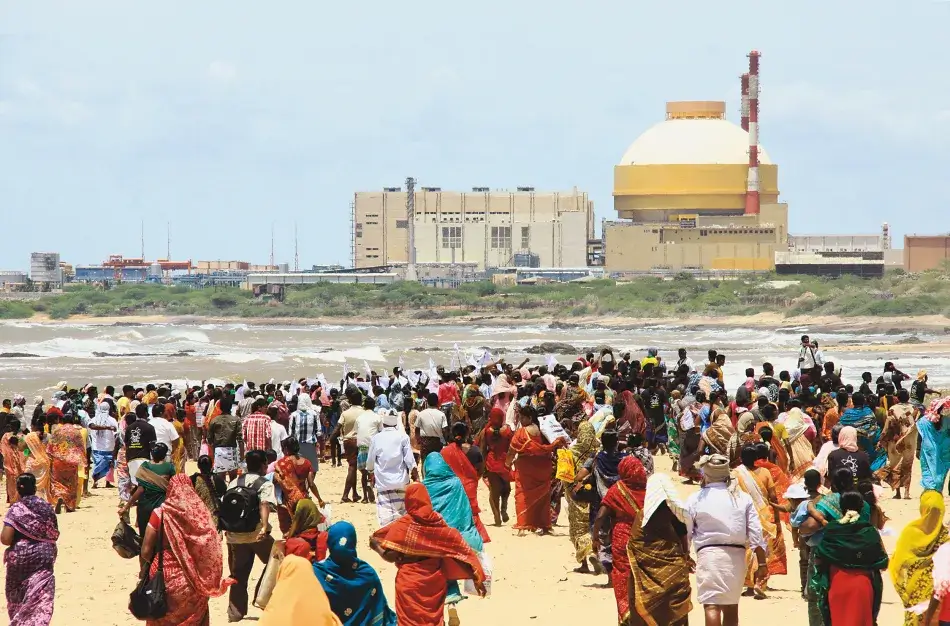
The Global Security and International Affairs program area draws on the expertise of policy-makers, practitioners, and scholars to foster knowledge and inform innovative and more substantial policies to address crucial issues affecting the global community. Projects underway in this area engage with pressing strategic development and moral questions that underpin relations among people, communities, and states worldwide. Each initiative embraces a broad conception of security as the interaction among human, national, and global security imperatives. Project recommendations move beyond the idea of security as the absence of war toward higher aspirations of collective peace, development, and justice.
Committee on International Security Studies
CHAIR
Scott D. Sagan
Stanford University
MEMBERS
Nicholas Burns
Harvard University
Antonia Chayes
Tufts University
Christopher Chyba
Princeton University
Karl Eikenberry
formerly, Stanford University; U.S. Army, ret.
Tanisha Fazal
University of Minnesota
Martha Finnemore
George Washington University
Nicholas Kristof
The New York Times
Susan Landau
Tufts University
Robert Legvold
Columbia University
Rose McDermott
Brown University
Steven E. Miller
Harvard University
Barry Posen
Massachusetts Institute of Technology
Adam Roberts
University of Oxford
Jennifer M. Welsh
McGill University
Paul H. Wise
Stanford University
Committee Meeting
Annual Meeting of the Committee on International Security Studies (CISS)
October 10, 2019
House of the Academy
Cambridge, MA
During the annual meeting, CISS members reviewed the progress of current projects within the Global Security and International Affairs program area, discussed how CISS members are seeking to ensure the impact of their various scholarly activities, and brainstormed key areas for future Academy work on global security and international affairs.
Meeting Chair
Scott D. Sagan
Stanford University
Keynote Speakers
Karl Eikenberry
formerly, Stanford University; U.S. Army, ret.
Nicholas Kristof
The New York Times
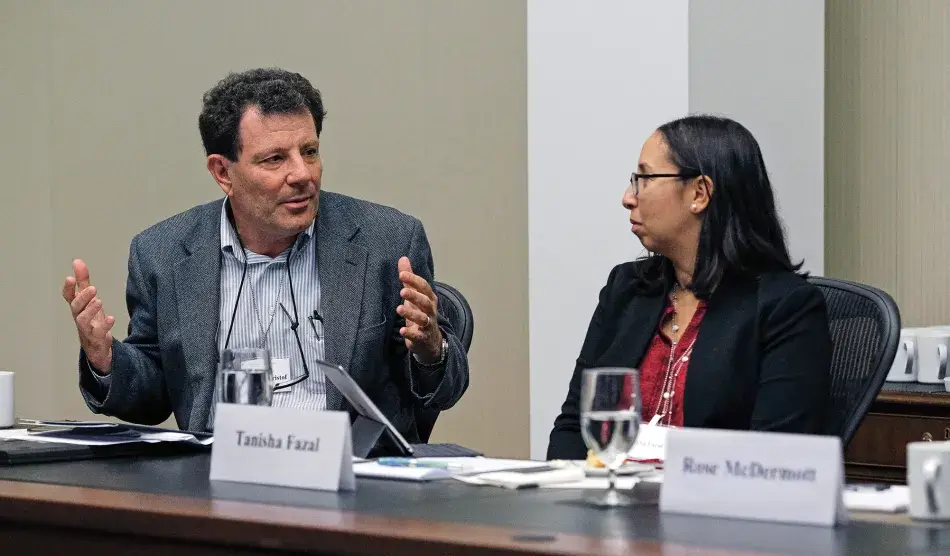
PROJECT
Meeting the Challenges of the New Nuclear Age, Phase One
The world has entered a new nuclear era. No longer dominated by two nuclear superpowers, the evolving multipolar nuclear order presents fundamental challenges to the conceptual and practical means of avoiding nuclear war. Moreover, the new era has slowly dismantled the bilateral arms control framework, with no clear prospect that it will be revived and extended. The possibility that a framework or frameworks encompassing other, let alone all, nuclear powers can be achieved seems even more remote. In addition, advances in weapons technology and the opening of new frontiers, such as cyber capabilities and artificial intelligence, make a shifting environment still more complex. The pathways to inadvertent nuclear war have multiplied across more regions and relationships.
Since 2017, the Meeting the Challenges of the New Nuclear Age project has worked to identify the major dangers generated by the dynamics of a multipolar nuclear world that pose the greatest threat of inadvertent nuclear war; offer alternative approaches to addressing each of these dangers; facilitate discussions with relevant communities in the United States and abroad; and encourage and assist policy-makers, Congress, the analytical community, and the media to think systematically about our increasingly multipolar world. The publications produced by the project have been shared widely with domestic and international policy-makers, scholars and students of nuclear affairs, and leaders of international organizations.
Meeting the Challenges of the New Nuclear Age is rooted in the critically important work on arms control that the Academy conducted from 1958 to 1960 to prevent a nuclear confrontation between the United States and the Soviet Union. During that time Academy Fellows gathered monthly to build a cooperative framework between the United States and the Soviet Union based on the limitations of the nuclear stockpile and the establishment of mutual vulnerability between the two rivals. The group included Donald Brennan, Edward Teller, Henry Kissinger, and Thomas Schelling, among others. Today, more than ever, an effort that brings together scholars and policy-makers to examine the wide range of challenges posed by the changing nuclear order is urgently needed.
Project Chairs
Robert Legvold
Columbia University
Christopher Chyba
Princeton University
Steering Committee
Thomas J. Christensen
Princeton University
Lynn Eden
Stanford University
Steven E. Miller
Harvard University
Janne Nolan†
George Washington University
Scott D. Sagan
Stanford University
Jon Wolfsthal
Nuclear Crisis Group
Working Group Members
James M. Acton
Carnegie Endowment for International Peace
Mark Bell
University of Minnesota
Linton Brooks
Center for Strategic and International Studies; formerly, U.S. Department of Energy and U.S. National Nuclear Security Administration
M. Taylor Fravel
Massachusetts Institute of Technology
Sumit Ganguly
Indiana University, Bloomington
Francis J. Gavin
Johns Hopkins School of Advanced and International Studies
Michael Krepon
Stimson Center
Hans Kristensen
Federation of American Scientists
Jessica Tuchman Mathews
Carnegie Endowment for International Peace
Nicholas Miller
Dartmouth College
Steven E. Miller
Harvard University
Vipin Narang
Massachusetts Institute of Technology
Janne Nolan†
George Washington University
Olga Oliker
International Crisis Group; formerly, Center for Strategic and International Studies
George Perkovich
Carnegie Endowment for International Peace
Steven Pifer
Stanford University; Brookings Institution; formerly, U.S. Department of State
William Potter
James Martin Center for Nonproliferation Studies, Middlebury Institute of International Studies at Monterey
Mira Rapp-Hooper
Yale Law School
Scott D. Sagan
Stanford University
Michael Swaine
Carnegie Endowment for International Peace
Nina Tannenwald
Brown University
Jane Vaynman
Temple University
Keren Yarhi-Milo
Princeton University
Project Staff
Poul Christiansen
Francesca Giovannini
Kathryn Moffat
Tania Munz
Brendan Roach
Kathleen Torgesen
Funders
Louise Henry Bryson and John E. Bryson
John F. Cogan, Jr.†
Lester Crown
Alan M. Dachs
Bob and Kristine Higgins
Richard Rosenberg
Kenneth L. and Susan S. Wallach
† Deceased
Project Publications
Meeting the Challenges of the New Nuclear Age: U.S. and Russian Nuclear Concepts, Past and Present, Linton Brooks, Alexei Arbatov, and Francis J. Gavin (American Academy of Arts and Sciences, 2018)
Meeting the Challenges of the New Nuclear Age: Emerging Risks and Declining Norms in the Age of Technological Innovation and Changing Nuclear Doctrines, Nina Tannenwald and James M. Acton, with an Introduction by Jane Vaynman (American Academy of Arts and Sciences, 2018)
Meeting the Challenges of the New Nuclear Age: Nuclear Weapons in a Changing Global Order, Steven E. Miller, Robert Legvold, and Lawrence Freedman (American Academy of Arts and Sciences, 2019)
Contemplating Strategic Stability in a New Multipolar Nuclear World, Robert Legvold (American Academy of Arts and Sciences, 2019)
“Meeting the Challenges of a New Nuclear Age,” Dædalus, edited by Robert Legvold & Christopher Chyba (2020)
Project Meeting
Nuclear Weapons in a Changing Global Order: Hill Briefings
July 31, 2019
Capitol Hill
Washington, DC
Steven Miller, a member of the project’s steering committee, and Academy staff briefed foreign policy and national security staff in several Senate offices on the Academy’s work on Meeting the Challenges of the New Nuclear Age as well as Promoting Dialogue on Arms Control and Disarmament. The discussions focused on key project findings, background on the changing multipolar nuclear order, and plans for continued engagement around the Academy’s portfolio of nuclear work.
Meeting Chair
Steven E. Miller
Harvard University
PROJECT
Meeting the Challenges of the New Nuclear Age, Phase Two: Deterrence and New Nuclear States
With the emergence of three new nuclear powers (India, Pakistan, and North Korea) and several more potentially becoming nuclear states (including Iran, Saudi Arabia, and Turkey), the world is on the verge of a new nuclear age, which will demand new thinking about the security implications of nuclear powers that may be in highly hostile environments, suffer from domestic instability, have fewer resources, or be led by personalist dictators. Phase Two of Meeting the Challenges of the New Nuclear Age investigates the deterrence and defense implications facing small nuclear force-countries and potential proliferators.
The project is producing an edited volume of innovative, policy-relevant essays that will be published by a university press. Outreach activities will be aimed at nuclear policy-makers (primarily in the United States) and academic centers and think tank institutes with a specific focus on nuclear studies.
Project Chairs
Scott D. Sagan
Stanford University
Vipin Narang
Massachusetts Institute of Technology
Advisory Committee
Victor Cha
Georgetown University
Lawrence Freedman
King’s College London
Robert Jervis
Columbia University
Jeffrey Lewis
Middlebury Institute for International Studies at Monterey
Rose McDermott
Brown University
Barry Posen
Massachusetts Institute of Technology
Gary Samore
Brandeis University
Caitlin Talmadge
Georgetown University
Project Staff
Poul Christiansen
Francesca Giovannini
Kathryn Moffat
Tania Munz
Brendan Roach
Kathleen Torgesen
Funders
Louise Henry Bryson and John E. Bryson
John F. Cogan, Jr.†
Lester Crown
Alan M. Dachs
Bob and Kristine Higgins
Richard Rosenberg
Kenneth L. and Susan S. Wallach
† Deceased
Project Meeting
Deterrence and New Nuclear States Authors’ Workshop
November 17–18, 2019
Stanford University
Stanford, CA
The authors of the forthcoming edited volume on deterrence and new nuclear states gathered for a two-day workshop to review the draft essays and discuss the volume’s cross-cutting conclusions and specific policy implications.
Meeting Chairs
Scott D. Sagan
Stanford University
Vipin Narang
Massachusetts Institute of Technology
Keynote Speaker
William J. Perry
Stanford University; formerly, U.S. Department of Defense
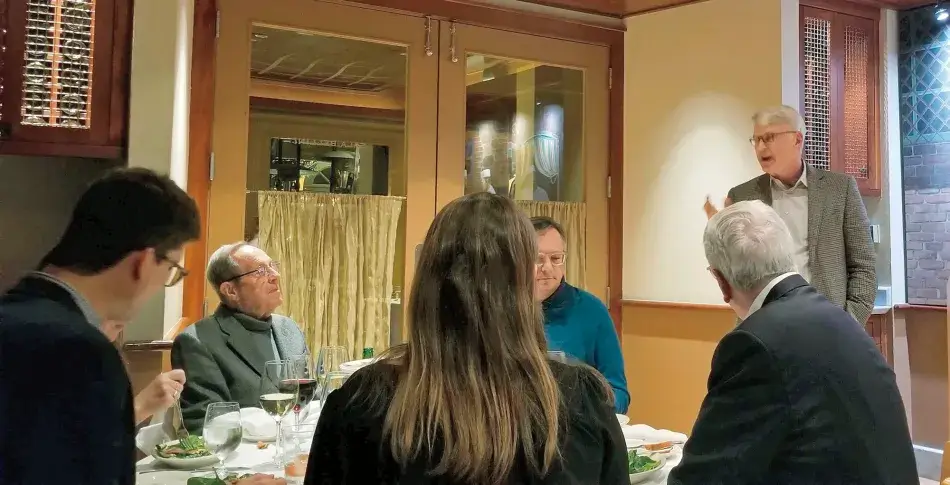
PROJECT
Promoting Dialogue on Arms Control and Disarmament
Unlike the Cold War, the current nuclear age is characterized by a simultaneous collapse of arms control agreements and the absence of any strategic dialogue among the three main nuclear players, which would serve to minimize and reduce the potential risks of a nuclear escalation.
One strand of the project’s work consists of a series of bilateral U.S.-Russia and U.S.-China dialogues designed to identify critical short-term goals in arms control. The meetings will identify areas for cooperation and conceptual thinking about measures that might strengthen strategic stability and help to reduce the significant dangers of nuclear weapons being used in the future. Through reports and outreach activities, the project aims to contribute to rebuilding trust and predictability among the rival Great Powers.
A second strand of work will build on the Academy’s experience organizing educational sessions for the United States Congress on a range of topics, including cybersecurity, disaster response, and federal research policy in addition to nuclear issues. Through a series of engagements with members of Congress and their staff, the project will help to foster and strengthen knowledge on key issues and challenges facing the United States in arms control and international security, including renewal of the New START treaty and the dangers of a world without nuclear constraints.
Project Chair
Steven E. Miller
Harvard University
Project Staff
Poul Christiansen
Francesca Giovannini
Kathryn Moffat
Tania Munz
John Randell
Brendan Roach
Kathleen Torgesen
Funder
The Raymond Frankel Foundation
Project Meetings
The Collapse of Arms Control: Implications and Consequences
October 23, 2019
Capitol Hill
Washington, D.C.
This briefing for congressional staffers from both House and Senate offices highlighted the perils associated with the decline and potential collapse of arms control and underscored the urgent need for dialogue among the key protagonists, particularly in the United States and Russia. Project Chair Steven Miller discussed how the global nuclear order has evolved since the Cold War, the implications of the collapse of arms controls agreements, the absence of any strategic dialogue among the three main nuclear players that would serve to minimize and reduce the potential risks of a nuclear escalation, and the Academy’s current nuclear policy work.
Meeting Chair
Steven E. Miller
Harvard University
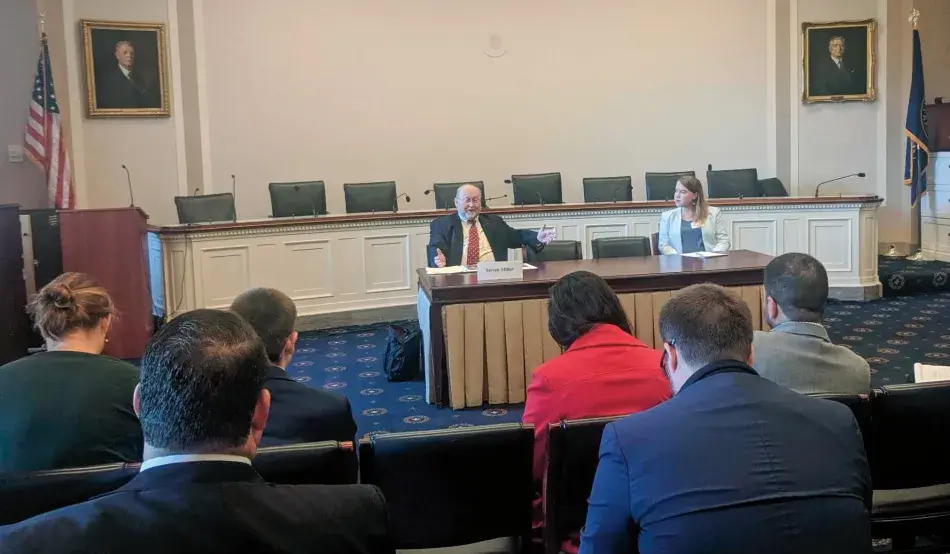
Shanghai Bilateral Meeting
December 4–5, 2019
Shanghai Academy of Social Sciences
Shanghai, China
Project Chair Steven Miller led a delegation of U.S. former officials and experts to a two-day meeting that focused on a number of arms control issues in order to gain a better understanding of Chinese perspectives on current arms control priorities. The meetings also revealed the areas on which Chinese experts would like to engage further with U.S. and Russian experts.
Meeting Chair
Steven E. Miller
Harvard University
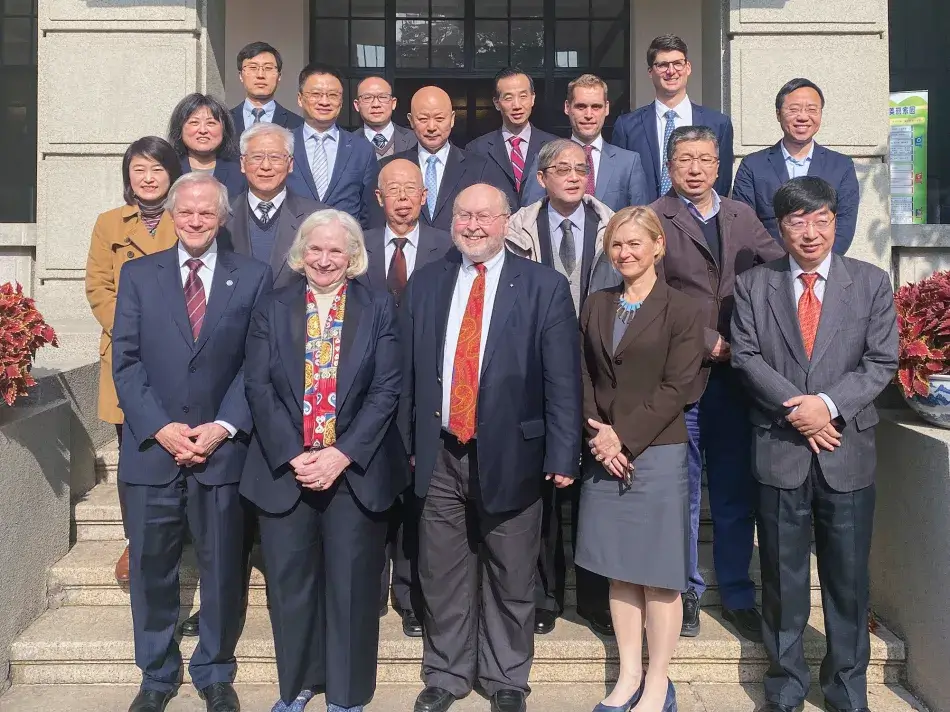
PROJECT
Civil Wars, Violence, and International Responses
The Civil Wars, Violence, and International Responses project stems from the observation that current multilateral approaches for preventing, mitigating, and resolving civil wars and intrastate violence are often far too ambitious. They frequently overpromise stability, security, peace, democracy, and development to countries experiencing high levels of violence and instability. The project identified six threats that emerge from civil wars and intrastate violence: pandemic diseases, transnational terrorism, migration, regional instability, great power conflict, and criminality. The project has engaged in extensive domestic and international outreach to share findings and recommendations that deliver a more comprehensive, effective, and integrated approach to conflict prevention and crisis management, which encompasses security, diplomacy, and development strategies in countries such as Colombia, Nigeria, Ethiopia, Syria, Lebanon, and Sri Lanka, among others. Building on these policy discussions, the project will publish a research paper that focuses on the policy implications of the project’s findings, which will be distributed to relevant policy-makers in the United States and internationally.
Project Chairs
Karl Eikenberry
formerly, Stanford University; U.S. Army, ret.
Stephen Krasner
Stanford University
Project Members
Michele Barry
Stanford University
Abdeta D. Beyene
Centre for Dialogue, Research, and Cooperation, Ethiopia
Stephen D. Biddle
Columbia University
Tanja A. Börzel
Freie Universität Berlin
Charles Call
American University
Susanna Campbell
American University
Martha Crenshaw
Stanford University
Lyse Doucet
BBC News
Tanisha Fazal
University of Minnesota
James Fearon
Stanford University
Vanda Felbab-Brown
Brookings Institution
Francis Fukuyama
Stanford University
Sumit Ganguly
Indiana University
Miguel García-Sánchez
Universidad de los Andes, Colombia
Richard Gowan
New York University
Sonja Grimm
University of Konstanz, Germany
Jean-Marie Guéhenno
International Crisis Group
Joseph Hewitt
United States Institute of Peace
Stephen Heydemann
Smith College
Bruce Jones
Brookings Institution
Stathis Kalyvas
Yale University
Nancy Lindborg
United States Institute of Peace
Sarah Kenyon Lischer
Wake Forest University
Clare Lockhart
Institute for State Effectiveness
Aila M. Matanock
University of California, Berkeley
Seyoum Mesfin
Institute for Advanced Research, Ethiopia
Stewart Patrick
Council on Foreign Relations
Barry Posen
Massachusetts Institute of Technology
William Reno
Northwestern University
Thomas Risse
Freie Universität Berlin
Hendrik Spruyt
Northwestern University
Stephen Stedman
Stanford University
Eric Stollenwerk
Freie Universität Berlin
Paul H. Wise
Stanford University
Project Staff
Francesca Giovannini
Summers Hammel
Kathryn Moffat
Tania Munz
Kathleen Torgesen
Funders
Humanity United
Smith Richardson Foundation
Oak Foundation
Project Publications
“Civil Wars & Global Disorder: Threats & Opportunities,” Dædalus, edited by Karl Eikenberry & Stephen Krasner (2017)
“Ending Civil Wars: Constraints & Possibilities,” Dædalus, edited by Karl Eikenberry & Stephen Krasner (2018)
PROJECT
Rethinking the Humanitarian Health Response to Violent Conflict
Rethinking the Humanitarian Health Response to Violent Conflict seeks to understand and address current trends in humanitarian contexts that pose new or evolving challenges for humanitarian health responders. Among the most pressing challenges are the increasingly protracted nature of civil and noninternational armed conflict; the fact that many of the world’s most violent places are facing criminal or political violence rather than conflict as conventionally understood; shortfalls in funding; and changing geopolitical relations. This project brings together political scientists, legal and security experts, health professionals, and humanitarians to examine current challenges to effective humanitarian action and to develop, where necessary, new strategies for preventing civilian harm and delivering critical health services in areas plagued by violent conflict.
The project’s initial work will focus on two key priority areas. First, building on its efforts to address the political and security dimensions of pandemic response in areas of weak governance and violent conflict, the initiative will convene a series of rapid-cycle workshops on global cooperation and pandemic control. Drawing upon the Academy’s strengths in political science, diplomacy, global health, and the arts, the project will explore how political legitimacy, trust in expert authority and information, divisive political environments, and cultural mechanisms of community protection and social cohesion shape the ability of states and international institutions to respond to infectious outbreaks.
Second, to respond to the acute challenges that humanitarian organizations face in addressing health needs in areas with extreme levels of political or criminal violence – settings that now account for more violent deaths than war zones – and in places where people are fleeing from such violence, the project will convene interdisciplinary groups of experts from across multiple regions to explore the questions state sovereignty poses for humanitarians operating in such settings and to analyze and examine how the dynamics of political and criminal violence influence humanitarian responses.
Project Chairs
Jaime Sepulveda
University of California, San Francisco
Jennifer M. Welsh
McGill University
Paul H. Wise
Stanford University
Project Staff
Francesca Giovannini
Kathryn Moffat
Tania Munz
Rebecca Tiernan
Kathleen Torgesen
Funders
Louise Henry Bryson and John E. Bryson
Project Meetings
Meetings in New York City
New York, NY
February 27–28, 2020
During a series of individual and small-group meetings, the project cochairs solicited input from experts with extensive experience in policy and diplomacy relating to humanitarian responses in areas of violent conflict and extreme levels of political and criminal violence.
Meeting Chairs
Jennifer M. Welsh
McGill University
Paul H. Wise
Stanford University